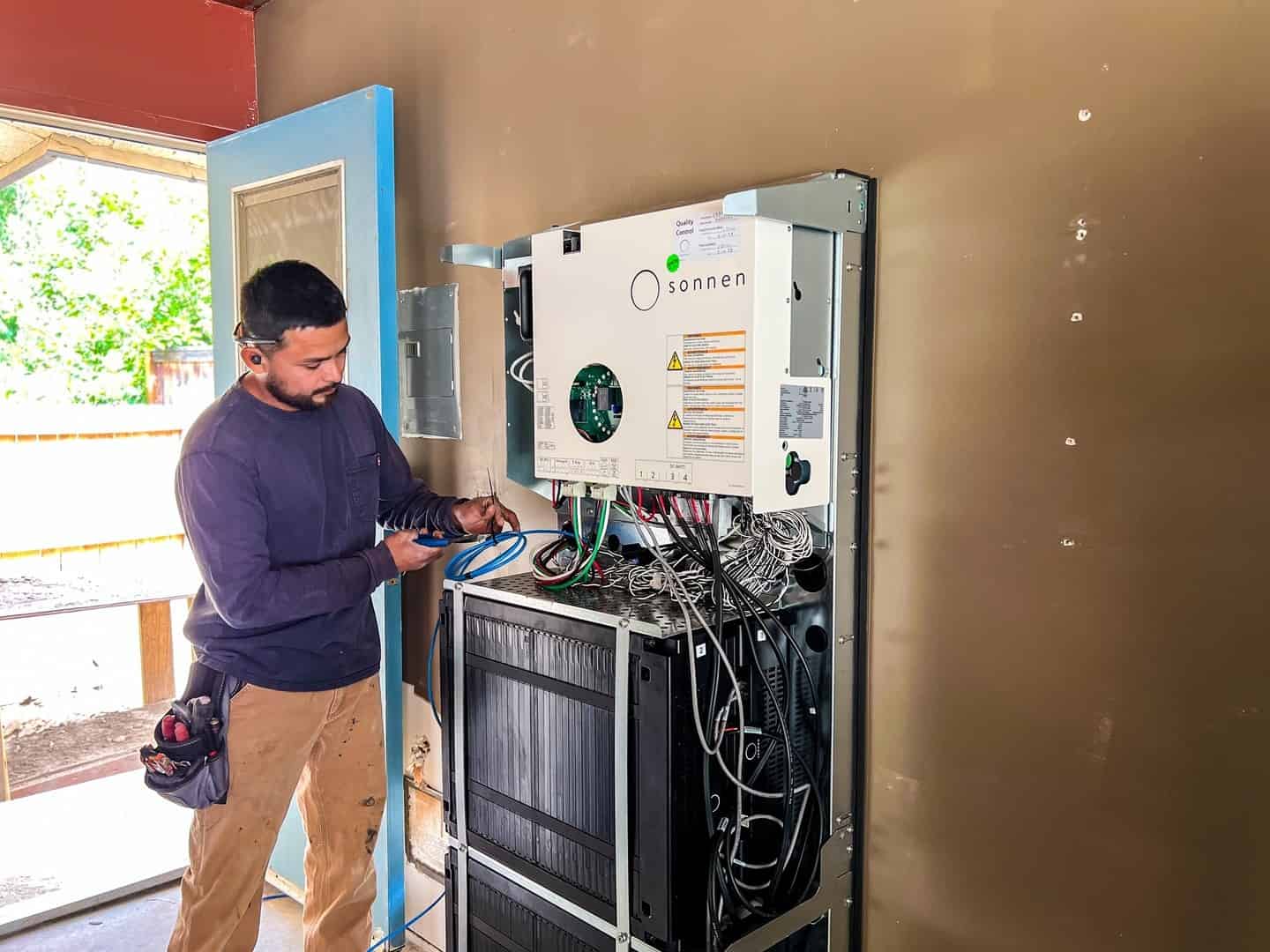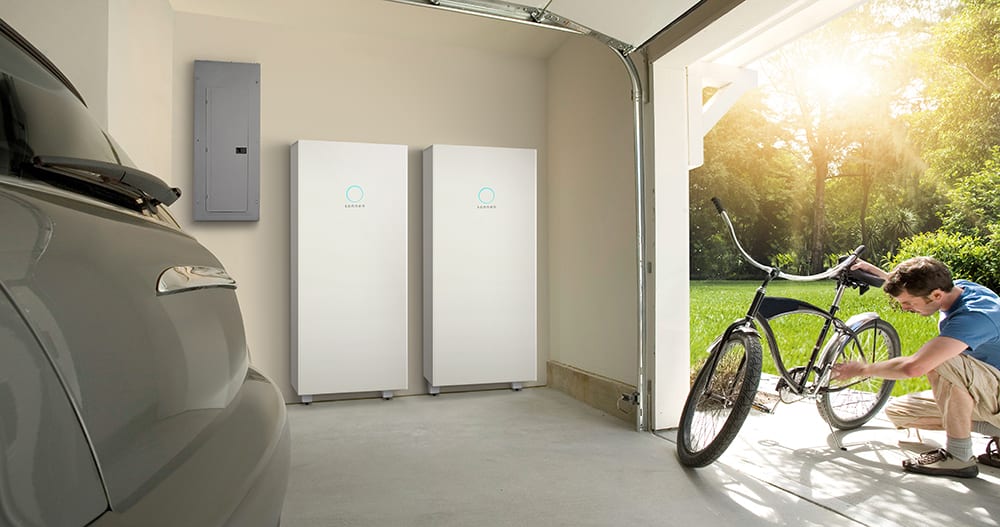Solar Pairs Well With Solar Battery Storage

When going solar today, there are a few things to consider beyond just how many solar panels you need. It’s time to think about how battery storage can help you maximize energy savings and provide backup power to your home. You’ll discover how solar battery storage benefits you and your home. After all, it takes money, effort, and time to get your system running. You should be able to enjoy it to its fullest.
What Does Solar Battery Storage Do?
A battery storage system essentially serves as a backup to your solar system. If you have a grid-tied solar system, any excess energy goes back into the grid. However, with battery storage, it holds that extra energy instead, giving you access to power even if you lose electricity from the grid. Once your batteries are charged, any excess energy produced from your solar panels goes right back into the grid as before.
With California’s new solar policy, NEM 3.0, export rates are reduced when power is sent back to the grid. This makes it harder to save on energy costs with a stand alone solar system. With battery storage, energy can be used when peak demand for energy is high. This in turn saves you on costs by not having to draw power from the grid during times of the day where electricity is more expensive.Solar battery systems allow you to use solar produced power on your own terms and any excess energy can be sent back to the grid.
The Top 5 Benefits of Battery Storage
There are plenty of perks to having solar battery storage. This list only scratches the surface, but it includes some of the biggest “pros” to installing battery storage.
1. Reduced Electricity Bills
Many people who opt to install solar systems do so with the hopes that they can pay less for electricity. Generally speaking, that’s true. Solar is a fantastic renewable energy source and it does reduce your electricity bills.
However, beginning April 13th, 2023, 100% solar production offset no longer helps California homeowners achieve energy savings.The coupling of solar and battery storage is needed because of the reduced rates for solar production. It is not possible to capture all available solar production without battery storage.
If you live in an area where utility companies charge more during certain parts of the day or times of the year, you can mitigate the extra cost with solar batteries. Use the energy stored in your batteries during peak times to reduce costs. A solar system must be properly sized and balanced with storage to ensure excess power in Spring and high-production months doesn’t escape to the grid at disconnected values.
Certain states will compensate you more for the energy your solar system feeds into the grid. But if you’re a California resident looking to go solar after April of 2023, will experience diminishing returns on the solar production they send to the grid during the peak months of sunlight (June, July, August). Store that in solar energy batteries instead. You can use it for your own power needs instead.
2. Less Carbon Footprint
The ability to “go green” is a big reason many choose to make the switch to solar energy. Solar is one of the best sustainable energy sources out there. The more you can rely on it and increase your self-sufficiency, the less of a carbon footprint you leave behind in the world. You’ll be reducing pollution and still meeting your own electricity needs.
3. Low Maintenance On Systems
Once you have your solar system installed and any battery storage systems online, there isn’t a lot more for you to do. They don’t require outside fuel, like generators, and they’ll be there and functional when you need them.
Beyond that, solar batteries have long lifespans. Some systems have decade-long warranties and last for thousands of cycles. Lithium-ion batteries, like the Tesla Powerwall, have a particularly long lifespan. Some batteries can last more than double what you’ll get from a generator, all while requiring little to no work on your end.
In addition to having low maintenance, Solar Maintenance Pros provides a Lifetime Labor Warranty on all our solar and battery storage systems. We check for performance issues with your panels and system, investigate and make repairs quickly to get you back on track.
4. Incentives and Credits
If you install a PV system between 2022 and 2032, you’ll likely be eligible for a 30% tax credit. Many homeowners aren’t aware that this credit also applies to battery storage systems when paired with solar installation. The Investment Tax Credit reduces the cost of adding solar by thousands of dollars, in addition to all the savings you’ll see on your electricity bill. That significantly reduces the costs of the systems overall, making them less daunting to install.
You could also be eligible for other incentives, credits, and local rebates. Check with your state (and locally) to see if you qualify for others.
5. Renewable Energy Independence
In addition to reducing your energy costs and all the other great perks on this list, solar battery storage gets you one step closer to achieving energy independence. If the grid goes offline and you lose power, your battery storage ensures that the important components of your home still have what they need.
If you live in an area that experiences regular power outages, having solar battery storage can make a major difference in your quality of life. It leaves you less reliant on the electric company and means you won’t go without much-needed power.
Frequently Asked Questions
What are 3 drawbacks to storing solar energy in batteries?
1. Higher Upfront Costs
With a solar panel and battery system installation, the investment is more expensive than with just a solar panel installation. The return on investment period will be longer as well due to the upfront investment size. Solar is an investment that has many benefits, and financial incentive is just one of those many benefits. People who decide to get both solar panels and solar batteries are reaping the rewards of long term cost savings, energy independence, and peace of mind knowing power outages will have little effect on comfort.
- More Complexity in Sizing to Fit Needs
It’s important to note that the criteria for solar panel and battery installation is a very different one than just how many solar panels you need to offset your annual energy usage. There’s a lot more complexity to the load calculations, net energy metering, and energy efficiencies that has to be well thought out and executed. Every home will be different in energy usage, as will every homeowner will be different in their energy goals. Figuring out a balance between all of the homeowners needs and the best size recommendation is a job for no other than Solar Negotiators.
- Limited Capacity For Total Energy Independence
While it’s possible to obtain full energy independence, most homeowners won’t need it. In order to go “off-grid” as many call it, you will likely need 3-4 batteries which can be a very expensive option.Having a battery or two to cover the basic needs of appliance usage in the home will be enough to save money on energy costs and provide some backup capability. The bigger the solar bank, the bigger the security. Get in touch with one of our solar experts to find out if that is something you’d like to explore as an option, we have you covered!
Should solar batteries be stored in a garage or outside?
Generally, you’d want to keep your solar battery stored in an area that doesn’t get too hot or too cold. Low freezing temperatures can affect your solar storage efficiency as it will limit the amount of energy you are able to discharge the colder it gets. In warmer areas such as places in California, it will be fine to install the solar battery in the garage. Find a professional solar battery installer that can help you decide on where the best location is for battery storage.
Another reason to keep in the garage is that it would be closer to your wiring unit and electric panels within an enclosed space. Leaving the battery system outside exposes the wiring to the environment which can get worn down faster.
Does a solar battery pay for itself?
Over long periods of time, a solar battery system should be able to last longer than 10 years. Average payback periods for battery storage will vary greatly depending on what your energy goals look like. Some customers will prioritize energy independence with home backup capabilities, which can extend the payback period significantly. However, if your goal is more savings-focused, it is likely our solar experts can help you design a solar and battery storage system that will bring you a return on your investment in just 10-12 years.
Final Thoughts
As you can see, there’s an abundance of reasons to install a battery storage system to make the most of your solar. It lets you use more of the solar power you produce throughout the day, reduces energy costs, and further separates you from the electric grid. If you’re going to go solar – go the whole way!


